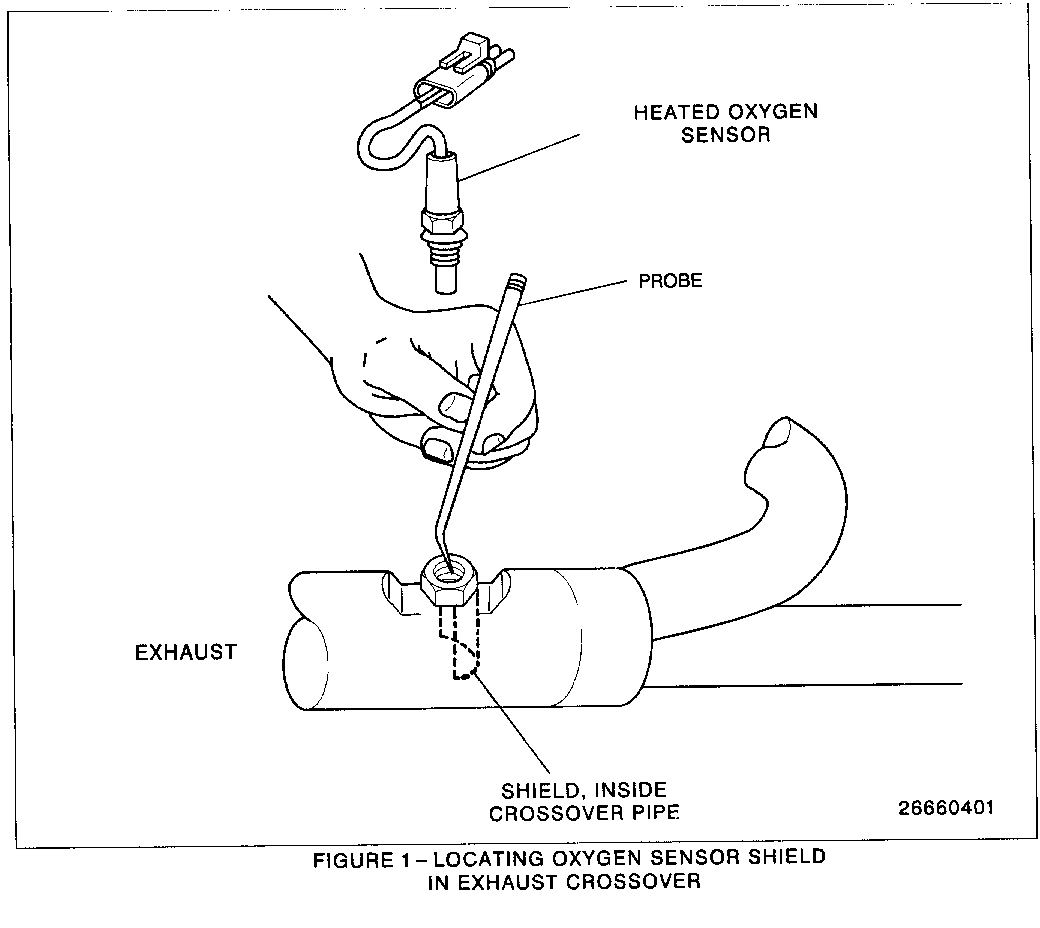POOR ENGINE PERFORMANCE/ILLUM. OF MALFUNCTION IND. LAMP

SUBJECT: POOR ENGINE PERFORMANCE/ILLUMINATION OF SES LAMP/DTC 44 (NEW CROSSOVER PIPE W/SHIELD)
MODELS: 1993 WL WITH 4.3L ENG EXCL RPO NB2
THIS BULLETIN CANCELS AND REPLACES GMC TRUCK BULLETIN 93-6F-56, DATED MARCH 1993. IT IS BEING REVISED TO CLARIFY THE ENGINES OF THE MODELS AFFECTED. THEY ARE 'Z' AND 'W', NOT 'E' AND 'W'. ALL COPIES OF BULLETIN 93-6F-56 SHOULD BE DISCARDED.
CONDITION
The SES light on the instrument panel cluster may illuminate on some 1993 M/L vans as a result of a Diagnostic Trouble Code (DTC) 44 being set. The symptoms of this condition would be poor engine performance, increased black exhaust smoke, a cracked sensor element and possibly the recurrence of a Heated Oxygen Sensor replacement for DTC 44 code.
CAUSE
The 1993 M/L vans have a larger diameter exhaust crossover pipe which allows for greater condensation in the system. Thus there is a chance for water droplets to flow down through the exhaust crossover and make contact with the Heated Oxygen Sensor. The result is thermal cracks inside the sensor element and the setting of DTC 44.
CORRECTION
To minimize this condition, a new design exhaust crossover pipe has been released for production and service. The new design incorporates a sleeve shield around the Heated Oxygen Sensor which eliminates the possibility of water droplets coming into contact with the sensor and causing thermal cracks inside the sensor element.
SERVICE PROCEDURE
Using a scan tool determine if the vehicle has set a DTC 44 (reference 1993 Light Duty Truck Fuel and Emissions Service Manual X-9336). Inspect the exhaust crossover pipe by using a probe in the oxygen sensor hole (see Figure 1). Determine if a sleeve shield already exists in the crossover pipe. If there is no sleeve found in the pipe than replacement of the crossover pipe and the heated oxygen sensor is required to eliminate DTC code 44.
VEHICLES INVOLVED
Vehicles built after the following VIN breakpoint were manufactured with a redesigned cross over pipe with a sleeve shield to protect the Heated Oxygen Sensor from possible water contamination and eliminating cracking of the sensor.
Year VIN
1993 PB502366
SERVICE PARTS INFORMATION
Model Part Description Number ----------------------------------------- L-Vans 15966223 Exhaust Crossover Pipe M-Vans 15965994 Exhaust Crossover Pipe M/L Vans 10096129 Sensor Heated Oxygen
Parts are currently available from GMSPO.
WARRANTY INFORMATION
For vehicles repaired under warranty, use:
Labor Op Labor Time -------- ---------- L2080 See Applicable Labor Time Guide

General Motors bulletins are intended for use by professional technicians, not a "do-it-yourselfer". They are written to inform those technicians of conditions that may occur on some vehicles, or to provide information that could assist in the proper service of a vehicle. Properly trained technicians have the equipment, tools, safety instructions and know-how to do a job properly and safely. If a condition is described, do not assume that the bulletin applies to your vehicle, or that your vehicle will have that condition. See a General Motors dealer servicing your brand of General Motors vehicle for information on whether your vehicle may benefit from the information.
